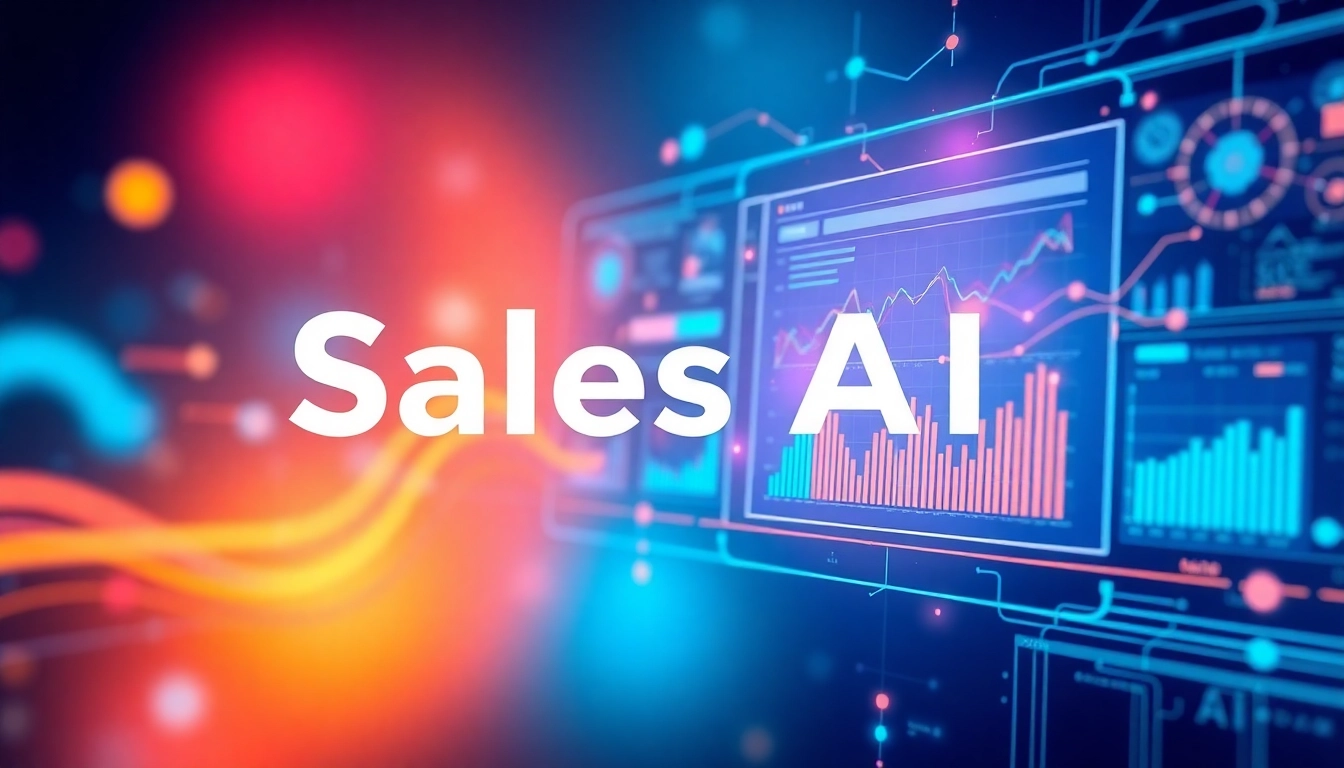Understanding Sales AI
In today’s fast-paced business landscape, Sales AI has emerged as a critical tool for organizations aiming to enhance their sales processes and drive revenue growth. This innovative technology leverages artificial intelligence to automate and optimize various aspects of sales, from lead generation to customer relationship management. As businesses increasingly rely on data-driven decision-making, understanding the fundamentals of Sales AI becomes essential for staying competitive.
What is Sales AI?
Sales AI refers to the use of artificial intelligence technology to support and enhance the sales process. It encompasses a range of tools and technologies that help sales teams streamline their operations, generate leads, manage customer relationships, and close deals more effectively. By analyzing vast amounts of data, Sales AI can provide actionable insights, automate repetitive tasks, and facilitate more personalized customer interactions. Key functionalities include predictive analytics, chatbots, sales automation, customer segmentation, and account intelligence.
The Importance of Sales AI in Modern Business
The integration of Sales AI into business strategies is no longer a novelty; it has become a necessity. In a digital economy characterized by consumer expectations for immediate responses and personalized interactions, businesses must leverage AI to meet these demands. Sales AI helps organizations:
- Enhance efficiency: By automating routine tasks, sales professionals can focus on building relationships and closing deals.
- Improve decision-making: AI analyzes data patterns and trends that humans may overlook, leading to better forecasts and strategic planning.
- Increase sales effectiveness: Sales AI tools enable sales teams to prioritize leads based on their likelihood to convert, ensuring optimal resource allocation.
- Boost customer satisfaction: Personalized interactions driven by AI can enhance customer experiences, fostering loyalty and repeat business.
Key Technologies Behind Sales AI
Several technologies drive the capabilities of Sales AI, including:
- Machine Learning: Algorithms that analyze historical sales data to predict future outcomes and identify sales opportunities.
- Natural Language Processing (NLP): Enables chatbots and virtual assistants to understand and respond to customer inquiries in real-time.
- Predictive Analytics: Uses statistical algorithms and machine learning techniques to identify the likelihood of future outcomes based on historical data.
- Robotics Process Automation (RPA): Automates repetitive tasks, such as data entry and lead nurturing, enhancing operational efficiency.
Benefits of Implementing Sales AI
Implementing Sales AI offers numerous advantages that can significantly transform a business’s sales operations. From streamlining processes to improving customer interactions, the benefits are far-reaching.
Streamlining Sales Processes
Sales AI automates many tedious tasks that previously consumed valuable time for sales teams. This includes data entry, lead scoring, and email follow-ups. By automating these repetitive tasks, companies can:
- Reduce human error: Automated systems are less likely to make mistakes, leading to more accurate data and fewer complications.
- Free up time: Sales representatives can focus on strategic activities, such as engaging potential clients and building relationships, rather than getting bogged down in administrative work.
Enhancing Customer Interactions
Sales AI enhances customer interactions by providing personalized experiences tailored to individual preferences and behaviors. AI-powered tools can analyze customer data to deliver insights that help sales teams:
- Understand customer needs: By analyzing historical data, AI can help identify customer preferences, leading to more relevant interactions.
- Respond promptly: AI chatbots can answer customer inquiries 24/7, providing immediate support when needed and improving customer satisfaction rates.
Boosting Revenue with Data Insights
One of the most compelling reasons to implement Sales AI is its ability to leverage data for improved revenue generation. AI tools can:
- Provide actionable insights: By analyzing sales data, AI can highlight trends and forecast future sales opportunities, enabling teams to make informed decisions.
- Optimize pricing strategies: AI can analyze market conditions and competitor pricing to recommend optimal pricing for products and services.
Choosing the Right Sales AI Tools
With a plethora of Sales AI tools available, choosing the right solution for your organization can be daunting. It is crucial to select tools that align with your business’s unique needs and objectives.
Overview of Popular Sales AI Solutions
Among the myriad of Sales AI solutions, some tools stand out due to their features and capabilities:
- Salesforce Einstein: An AI-powered feature within Salesforce that provides insights and recommendations to improve sales and customer engagement.
- HubSpot Sales AI: Offers tools for prospect tracking, lead scoring, and email tracking, enhancing the sales process while enabling personalization.
- Outreach: A sales engagement platform that uses AI to optimize communication strategies and improve customer interactions.
Criteria for Selection
When evaluating Sales AI tools, consider the following criteria:
- Ease of use: Look for tools that are user-friendly and easy to integrate with existing systems.
- Scalability: Ensure that the solution can grow with your business and adapt to changing needs.
- Customer support: Choose vendors that provide robust support and resources to assist your team.
Case Studies of Successful Implementation
Real-world examples can provide valuable insight into how Sales AI can benefit businesses:
- Company A: A mid-sized SaaS provider implemented a Sales AI tool that automated lead scoring and customer segmentation. As a result, they saw a 30% increase in qualified leads and a 20% growth in revenue within six months.
- Company B: A retail organization utilized an AI-powered chat system, reducing response times to customer inquiries from 24 hours to mere minutes, leading to a 50% increase in customer satisfaction ratings.
Challenges in Adopting Sales AI
While the benefits of Sales AI are compelling, organizations may encounter challenges during the adoption process. Recognizing these hurdles and planning for them is essential for successful implementation.
Common Pitfalls and How to Avoid Them
Here are some common pitfalls organizations may face when integrating Sales AI, along with strategies to avoid them:
- Lack of strategy: Companies often rush into implementation without a clear strategy. To avoid this, develop a well-defined plan that outlines how AI will fit into your overall sales strategy.
- Resistance to change: Employees may resist adopting new technologies. To counter this, invest in comprehensive training programs and clearly communicate the benefits of AI.
Integrating Sales AI with Existing Systems
Seamless integration of Sales AI tools with existing CRM and sales systems is critical. This can be achieved by:
- Choosing compatible tools: Select AI solutions that easily integrate with your current technology stack.
- Collaborating with IT teams: Engage IT professionals early in the process to help facilitate integration and address technical challenges.
Measuring Success and ROI
Determining the effectiveness of Sales AI implementation is crucial. Key performance indicators to track include:
- Lead conversion rates: Measure the percentage of leads that convert to sales before and after implementing AI solutions.
- Time saved on administrative tasks: Analyze how much time sales representatives save due to automation.
- Customer satisfaction scores: Assess any changes in customer satisfaction levels to gauge the impact of enhanced interactions.
The Future of Sales AI
As technology evolves, so too does the landscape of Sales AI. Understanding emerging trends can help businesses prepare for the future.
Emerging Trends and Innovations
The future of Sales AI will likely be shaped by several key trends:
- Integration of AI and Customer Experience: Businesses will increasingly leverage AI to enhance customer experiences through personalized interactions based on detailed customer insights.
- Improvement in Data Security: As concerns about data protection grow, AI tools will prioritize more robust safeguards to protect customer data and comply with regulations.
Predictions for Sales AI Development
In the coming years, Sales AI technologies are predicted to become more sophisticated, offering greater predictive capabilities and insights. Additionally, the rise of generative AI will influence how sales teams create content and engage with customers.
How Businesses Can Prepare for Change
To thrive in the rapidly-evolving Sales AI landscape, organizations should:
- Invest in training: Equip employees with the knowledge and skills needed to leverage AI effectively.
- Stay informed: Regularly assess emerging technologies and trends in AI to ensure your sales strategy remains competitive.



